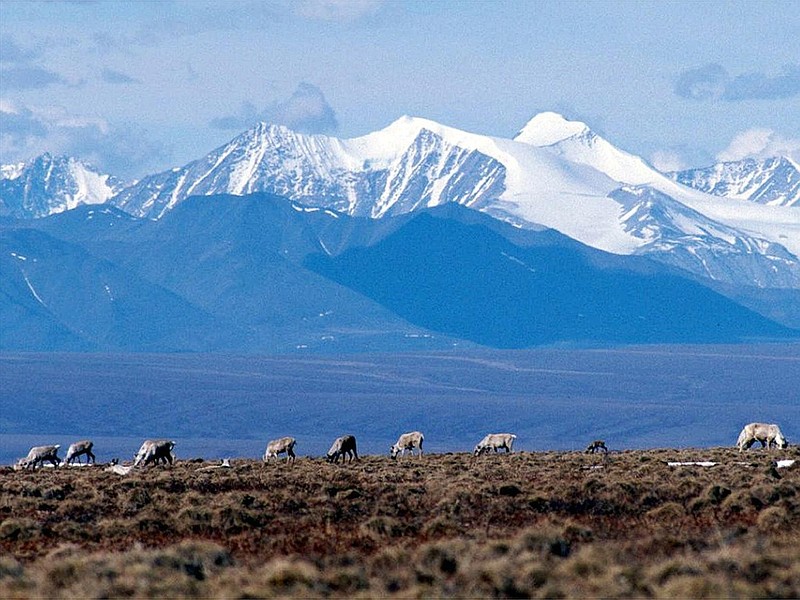JUNEAU, Alaska -- The U.S. Interior Department on Wednesday canceled the remaining seven oil and gas leases in Alaska's Arctic National Wildlife Refuge that were part of a sale held in the waning days of the Trump administration.
The action angered state political leaders, including Alaska's Republican governor, who threatened to sue.
Interior Secretary Deb Haaland said that with her decision to cancel the remaining leases, "no one will have rights to drill for oil in one of the most sensitive landscapes on earth." However, a 2017 law mandates another lease sale by late 2024. Administration officials said they intend to comply with the law.
Haaland called climate change "the crisis of our lifetime, and we cannot ignore the disproportionate impacts being felt in the Arctic." She defended the Biden's administration's record in addressing the changing climate.
Wednesday's announcement comes months after the administration's approval of a large oil project in the National Petroleum Reserve-Alaska drew condemnation from environmental groups who said it was at odds with President Joe Biden's climate goals. Litigation over the approval of ConocoPhillips Alaska's Willow project is pending.
Alaska political leaders have long pushed to allow oil and gas drilling on the Arctic National Wildlife Refuge's 1.5 million acre coastal plain, an area seen as sacred to the Indigenous Gwich'in because it is where caribou they rely on migrate and come to give birth. The plain, which lies along the Beaufort Sea on Alaska's northeastern edge, is marked by hills, rivers and small lakes and tundra. Migratory birds and caribou pass through the plain, which provides habitat for wildlife, including polar bears and wolves.
Drilling opponents Wednesday urged Congress to repeal the leasing provision from the 2017 law and permanently make the coastal plain off-limits to drilling.
Those who back development see it as a way to increase oil production, generate revenue and create or sustain jobs. Alaska's congressional delegation in 2017 succeeded in getting language added to a federal tax law that called for the U.S. government to hold two lease sales in the region by late 2024.
In a statement, Alaska Republican U.S. Sen. Dan Sullivan asked what investor would consider investing millions of dollars in the refuge "having just witnessed the administration pull the rug out from under the last standing lessee from the previous sale? Unfortunately, that seems to be the point."
Alaska Republican Gov. Mike Dunleavy vowed a legal fight.
"We will fight for Alaska's right to develop its own resources and will be turning to the courts to correct the Biden Administration's wrong," he said.
"Today's announcement sets a concerning precedent for the future of oil and natural gas leasing on federal lands, said Holly Hopkins, a vice president at the American Petroleum Institute, which represents oil and gas companies. She accused the Biden administration of sending "mixed signals" about drilling in the United States.
Two other leases that were issued as part of the first-of-its-kind sale for the refuge in January 2021 were previously given up by the small companies that held them amid legal wrangling and uncertainty over the drilling program.
President Joe Biden, after taking office, issued an executive order calling for a temporary moratorium on activities related to the leasing program and for the Interior secretary to review the program. Haaland later in 2021 ordered a new environmental review after concluding there were "multiple legal deficiencies" underlying the Trump-era leasing program. Haaland halted activities related to the leasing program pending the new analysis, which was released Wednesday.
Biden had approved Willow under intense political pressure. He said later he was compelled to because the company had legal leases for the area that predated his presidency.
But he announced that decision along with a plan to give "maximum protection," a status authorized for Congress, for an additional 13 million acres in the reserve. Wednesday's move makes that plan an official proposal, including requirements for environmental mitigation for 2.4 million acres where oil leasing can still happen there, and the ban on oil and gas leasing for the rest of it.
The Alaska Industrial Development and Export Authority, a state corporation that won seven leases in the 2021 sale, sued over the moratorium, but a federal judge recently found the delay by Interior to conduct a new review was not unreasonable.
The corporation obtained the leases to preserve drilling rights in case oil companies did not come forward. Major oil companies sat out the sale, held after prominent banks had announced they would not finance Arctic oil and gas projects.
Bernadette Demientieff, executive director of the Gwich'in Steering Committee, in a statement thanked the administration for the lease cancellation but said "we know that our sacred land is only temporarily safe from oil and gas development. We urge the administration and our leaders in Congress to repeal the oil and gas program and permanently protect the Arctic Refuge."
While the administration's move Wednesday would do nothing to stop the Willow development, it would ensure long-term protections for areas that provide vital wildlife habitat, said Chris Wood, president of the conservation group Trout Unlimited. He estimated that the federal government hasn't set aside so many acres of land for conservation since the early 2000s.
"Conservation is a very long game and takes decades," Wood said. "It's rare to have these big-stroke opportunities. So it's terrific and heartening to see the administration demonstrate they have a bit of a bold streak when it comes to protecting our lands and waters."
Information for this article was contributed by Becky Bohrer of The Associated Press, Timothy Puko of The Washington Post and Lisa Friedman of The New York Times.
